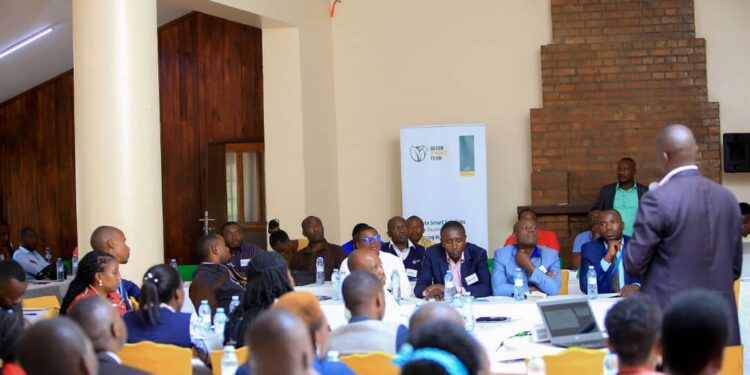In a stark warning, experts have revealed that climate change looms a formidable threat to Uganda’s economy, with a staggering $3.2 billion worth of GDP at risk.
In a green finance capacity building training for financial institutions held in Ntungamo Municipality on July 25th, Mr. Henry Ssegawa, a financial expert affiliated with the Uganda Institute of Banking and Financial Services, emphasized that the frequency of rising temperatures has been on the rise.
This according to him has led to a sharp decline in accessible water for people, crops, and animals, not only within Uganda but also across East Africa.
This alarming situation has serious repercussions on agricultural production, a key contributor to Uganda’s economy as it employs 72% of the national population and contributes 25% to the country’s GDP, according to 2022 statistics from the Ministry of Agriculture, Animal Industry & Fisheries (MAAIF).
Citing data from the Climate Change Department of the Ministry of Water and Environment, Mr. Ssegawa highlighted that Uganda may incur annual climate change costs ranging from $3.2 billion to $5.9 billion by 2025, with the sectors most affected being water, energy, agriculture, and infrastructure.”
“That’s a great loss that we want to avert through products that do climate change mitigation and climate change adaptation,” said Ssegawa.
The findings come amidst escalating concerns over the far-reaching impacts of climate-related disasters, underscoring the urgent need for decisive action to safeguard the economy and livelihoods countrywide.
As the crisis intensifies, leaders and policymakers face mounting pressure to implement comprehensive adaptation and mitigation measures to counter this potential economic catastrophe.
Financial institutions, such as banks and microfinance institutions, are undergoing training on how to evaluate businesses and projects that promote green financing and renewable energy, with the potential for funding.
The training is being conducted by aBi Finance, in collaboration with the Uganda Institute of Banking and Financial Services.
Mr. Noah Owomugisha, the head of investments – green growth and business development services at aBi, emphasized the importance of equipping financial institutions with knowledge in green finance to address climate challenges.
The aim is to empower these institutions to provide green finance options to agribusinesses and smallholder farmers. By adopting green financing, they can ensure sustainable agricultural practices, safeguard productive soils, and support households in the long run.
Traditionally reliant on rainwater for cultivation, the majority of Uganda’s farmers are now grappling with unpredictable weather patterns, leading to decreased agricultural productivity. Crops are failing, and farmers are struggling to adapt to the changing conditions.
With agriculture being the backbone of Uganda’s economy, this adverse impact is reverberating across the nation. Food scarcity, price fluctuations, and economic instability are just a few of the concerning consequences witnessed.
In response to this imminent crisis, the Ugandan government is partnering with international organizations and climate experts to develop climate-resilient agricultural practices.
Emphasizing water conservation, afforestation, reafforestation, agroforestry, crop diversification, and adoption of drought-tolerant seeds are some measures being implemented to mitigate the challenges.
However, urgent and collective efforts are needed to safeguard Uganda’s agricultural sector and ensure the well-being of its farming communities.
As climate change continues to disrupt rain-fed agriculture, proactive measures and sustainable solutions are essential to secure a greener and more resilient future for Uganda.
Do you have a story in your community or an opinion to share with us: Email us at editorial@watchdoguganda.com













